高中英语语法——情态动词总结(附带练习)
(完整)英语语法 情态动词及练习题

情态动词一、知识梳理/提炼1. can和could的用法表示能力或客观可能性,还可以表示请求和允许。
如:Can you finish this work tonight?Man cannot live without air.— Can I go now?— Yes, you can.注意:①could也可表示请求,语气委婉,主要用于疑问句,不可用于肯定句,答语应用can (即could不能用于现在时态的简略答语中)。
如:Could I come to see you tomorrow?Yes, you can。
(否定答语可用No, I'm afraid not。
)②can表示能力时,还可用be able to代替。
如:I'll not be able to come this afternoon。
2。
may和might的用法1)表示许可.表示请求、允许时,might比may的语气更委婉一些,否定回答时要用mustn't表示“不可以"、“禁止"、“阻止”之意.如:You may drive the car.— Might I use your pen? — No,you can’t/ mustn't. Yes, you can/may. 用May I .。
. 征询对方许可在文体上比较正式,在口气上比较客气。
在日常口语中,用CanI ... 征询对方意见在现代口语中更为常见.2) 用于祈使句中表示祝愿.如:祝你成功! May you succeed!3)表示推测、可能(疑问句不能用于此意)。
他现在可能很忙. He may be very busy now。
3。
must和have to的用法1) 表示必须、必要。
如:You must come in time.回答must引出的问句时,如果是否定的回答,不能用mustn't,而要用needn't或don't have to。
高中英语情态动词练习(附答案)

高中英语语法练习-情态动词一、基础练习1.He ___ have completed his work; otherwise, he wouldn't be enjoying himself by the seaside.A. shouldB. mustC. wouldn'tD. can't2. I _____ have been more than six years old when the accident happened.A. shouldn'tB. couldn'tC. mustn'tD. needn't3. This cake is very sweet. You ____ a lot of sugar in it.A. should putB. could have putC. might putD. must have put4. He paid for a seat, when he ____ have entered free.A. couldB. wouldC. mustD. need5. I was on the highway when his car went past followed by a police car. They ____ at least 150 kilometers an hour.A. should have been doingB. must have been doingC. could have doneD. would have done6. — Tom is never late for work. Why is he absent today?— Something __________ to him.A. must happenB. should have happenedC. could have happenedD. must have happened7. - Do you know where David is? I couldn't find him anywhere.- Well. He _______ have gone far-his coat is still here.A. shouldn'tB. mustn'tC. can'tD. wouldn't8. -Lucy doesn't mind lending you her dictionary.- She __________. I've already borrowed one.A. can'tB. mustn'tC. needn'tD. shouldn't9. - Catherine, I have cleaned the room for you.- Thanks. You _____ it. I could manage it myself.A. needn't doB. needn't have doneC. mustn't doD. shouldn't have done10. There________ be any difficulty in passing the road test since you have practised a lot in the driving school.A. mustn'tB. shan'tC. shouldn'tD. needn't11. - The woman biologist stayed in Africa studying wild animals for 13 years before she returned.-Oh, dear! She ________ a lot of difficulties!A. may go thoughB. might go throughC. ought to have gone throughD. must have gone though12. -I've taken someone else's green sweater by mistake.-It ______ Harry's. He always wears green.A. has to beB. will beC. mustn't beD. could be13. Helen _______ go on the trip with us, but she isn't quite sure yet.A. shallB. mustC. mayD. can14. If I ________ plan to do anything I wanted to, I'd like to go to Tibet and travelthrough as much of it as possible.A. wouldB. could C have to D. ought to15. You might just as well tell the manufacturer that male customers_____ not like the design of the furniture.A. mustB. shallC. mayD. need16. -Who is the girl standing over there?- Well, if you ______ know, her name is Mabel.A. mayB. canC. mustD. shall17. Children under 12 years of age in that country______ be under adult supervisionwhen in a public library.A. mustB. mayC. canD. need18. "The interest ______ be divided into five parts, according to the agreement madeby both sides," declared the judge.A. mayB. shouldC. mustD. shall19. -- I'll tell Mary about her new job tomorrow.--You _______ her last week.A. ought to tellB. would have toldC. must tellD. should have told20. I ______ pay Tom a visit, but I'm not sure whether I will have time this Sunday.A. shouldB. mightC. wouldD. could21. --I don't mind telling you what I know.--You ________. I'm not asking you for it.A. mustn'tB. may notC. can'tD. needn't22. --Excuse me, but I want to use your computer to type a report.--You________ have my computer if you don't take care of it.A. shan'tB. might notC. needn'tD. shouldn't23. --Excuse me. Is that the right way to the Summer Palace?--Sorry, I'm not sure, but it ______ be.A. mightB. willC. mustD. can24. --Mum, I've been studying English since 8 o'clock. ________ I go out and playwith Tom for a while?--No, I'm afraid not. Besides, it's raining outside now.A. can'tB. wouldn'tC. may notD. won't25. I often see lights in that empty house. Do you think I _____report it to the police?A. shouldB. mayC. willD. can26. Mr. White_______ at 8:30 for the meeting, but he didn't show up.A. should have arrivedB. should arriveC. should have had arrivedD. should be arriving27. You ________ be tired-you've only been working for an hour.A. must notB. won'tC. can'tD. may not二、提高练习1.--- Shall I tell John about it?--- No, you ______. I’ve told him already.A. needn’tB. wouldn’tC. mustn’tD. shouldn’t2. --- There were already five people in the car, but they managed to take me as well.--- It ______ a comfortable journey.A. can’t beB. shouldn’t beC. mustn’t have beenD. couldn’t have been3. --- Why didn’t you come to see me?--- I ______, but I was too busy yesterday.A. like toB. should like toC. would like to haveD. am going to-behaved gentleman ______ be so rude to a lady.4. You can’t imagine that a wellA. mightB. needC. shouldD. would5. There was plenty of time; she ______.A. mustn’t have hurriedB. needn’t have hurriedC. may not have hurriedD. wouldn’t have hurried6. --- Is John coming by air?--- He should, but ______ not. He likes taking trains.A. mustB. canC. needD. may7. --- ______ it be Li Ping who broke the glass?--- No. It ______ be Wang Hai who did it.A. Could; mayB. Can; canC. May; mustD. Can; must8. When the old man was alive, he ______ sit for hours at the door.A. wouldB. couldC. mustD. might9. Jack, you ______ play with the knife; you ______ hurt yourself.A. won’t; can’tB. mustn’t; mayC. shouldn’t; mustD. can’t; should10. I’ve decided to take the job and I ______ change my mind.A. mustn’tB. can’tC. won’tD. may not11. She ______ into the thick forest alone on such a dark night.A. dares not goB. dares not to goC. dare not to goD. doesn’t dare to go12. My parents never remember my telephone number, and they always ______ look it up.A. mustB. canC. shouldD. have to13. --- Where is Jack? I can’t find him anywhere.--- He ______ his homework upstairs.A. might have doneB. must have doneC. might be doingD. must do14. He ______ you more help, even though he was very busy.A. might have givenB. might giveC. may have givenD. may give15. --- If he ______, he ______ that food.--- Luckily he was sent to the hospital immediately.A. was warned; would not takeB. had been warned; would not have takenC. would be warned; had not takenD. would have been warned; had not taken16. --- I hear you've got a set of valuable Australian coins. ____I have a look ?--- Yes, certainly.A. DoB. MayC. ShallD. Should17. — When can I come for the photos? I need them tomorrow afternoon.。
【备战高考】英语语法情态动词归纳总结

【备战高考】英语语法情态动词归纳总结一、单项选择情态动词1.---We want someone to design the new art museum for me.---_____ the young fellow have a try?A.Shall B.May C.Will D.Need【答案】A【解析】【详解】考查情态动词。
句意:——我们想找人为我设计一个新的艺术博物馆。
——是不是让这位年轻小伙子试一试?shall作为情态动词,用于二三人称,表示"询问","警告","允诺","命令","决心","强制"等语气。
will作为情态动词,用于主语是各种人称的陈述句中,表示"意愿"和"倾向"。
用于第二人称的疑问句中,表"请求"。
故选A。
2.Paul did a great job in the speech contest. He many times last week.A.need have practised B.might practiseC.must have practised D.could practise【答案】C【解析】【详解】考查情态动词。
句意:保罗在演讲比赛中表现得很好。
他上星期一定练习了很多次。
must have done是对过去发生的动作最有把握的猜测,意思是“一定”。
故C选项正确。
3.— Excuse me, do you mind if I open the window?— Well, if you __________. I can put on more clothes.A.can B.mayC.must D.shall【答案】C【解析】【详解】考查情态动词。
句意:-不好意思,我把窗户打开你介意吗?- 好吧,如果你必须这么做的话。
【英语语法】情态动词can的用法(附练习及答案)
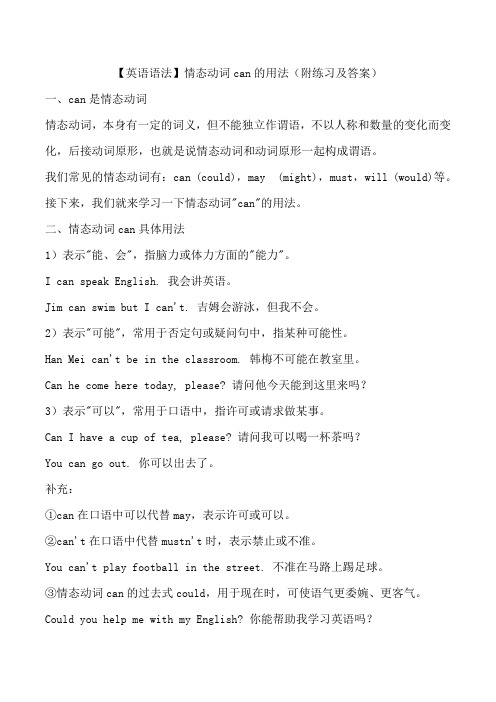
【英语语法】情态动词can的用法(附练习及答案)一、can是情态动词情态动词,本身有一定的词义,但不能独立作谓语,不以人称和数量的变化而变化,后接动词原形,也就是说情态动词和动词原形一起构成谓语。
我们常见的情态动词有:can (could),may (might),must,will (would)等。
接下来,我们就来学习一下情态动词"can"的用法。
二、情态动词can具体用法1)表示"能、会",指脑力或体力方面的"能力"。
I can speak English. 我会讲英语。
Jim can swim but I can't. 吉姆会游泳,但我不会。
2)表示"可能",常用于否定句或疑问句中,指某种可能性。
Han Mei can't be in the classroom. 韩梅不可能在教室里。
Can he come here today, please? 请问他今天能到这里来吗?3)表示"可以",常用于口语中,指许可或请求做某事。
Can I have a cup of tea, please? 请问我可以喝一杯茶吗?You can go out. 你可以出去了。
补充:①can在口语中可以代替may,表示许可或可以。
②can't在口语中代替mustn't时,表示禁止或不准。
You can't play football in the street. 不准在马路上踢足球。
③情态动词can的过去式could,用于现在时,可使语气更委婉、更客气。
Could you help me with my English? 你能帮助我学习英语吗?三、情态动词can的基本句型1)肯定句型为:主语+can+动词原形+其它。
They can play basketball. 他们能打篮球。
专题4 情态动词-2020-2021学年高一英语期末备考语法专练(解析版)

情态动词1. —Jane, why don’t you take a bite of the chocolate?—Well, I am on diet, if you __________know.A. mustB. shallC. wouldD. could【答案解析】A【详解】考查情态动词。
句意:——简,你为什么不咬一口巧克力呢?——好吧。
我在节食,如果你一定要知道的话。
A. must必须,一定;B. shall将要;C. would将会;D. could能够,可以。
此处if you must know为习惯表达,其中的must表示执意,即执意要做某事,表示“如果你必须知道,如果你一定要知道的话”。
故选A。
2. —Peter, you delivered a wonderful speech today.—Thanks, but I think I ______ more attention to my stage manners during that time.A. must payB. should payC. must have paidD. should have paid【答案解析】D【详解】考查情态动词+have done。
句意:---彼得,你今天的演讲很精彩。
---谢谢,但我认为在那段时间我应该多注意我的舞台礼仪。
should have done表示本应该做某事而实际上没有做某事。
由“but”可知,我那段时间本应该多注意我的舞台礼仪,而实际上并没有注意。
故选D项。
3. It’s nearly 7 o’clock. Jack ____________ be here at any moment.A. shallB. had toC. ought toD. have to【答案解析】C【详解】考查情态动词。
句意:现在已经七点钟了。
杰克应该会随时出现的。
ought to"应当",表示推测和可能性;shall常用于主语是第一人称的句子中,如果主语是第二、三人称,则表示"责备,警告"等;have to"必须",强调客观需要。
高中英语语法——情态动词总结(附带练习)

情态动词总结I 情态动词的特征:1.本身有词义。
2.不能独立作谓语。
2. 后接动词原形一起构成谓语。
3. 不随人称和数的变化。
II 情态动词各自的基本意义及用法:1.大多数情态动词(除表‘能力、许可、意志’外),都可以表示推测,其程度有差异。
按可能性程度的高低排列为:must﹥will ﹥would ﹥ought to ﹥should完全肯定完全可能很可能﹥can ﹥could﹥may ﹥might可能有可能2. 区分情态动词的否定含义:may not或许不、可能不might not可能不can’t 不可能mustn’t不许、禁止shouldn’t不应该needn’t 不必1.情态动词表推测的反意疑问句,简单来说,就是以情态动词后的时态为淮,如句子里有明确的时间状语,则以其为准。
2.以must 为例:E.g. 1. You must be hungry now, aren’t you?2. He must be watching TV , isn’t he ?3 Tom must have lived her for a long time, hasn’t he ?4. She must have arrived yesterday, didn’t she?注:如选择题中(以She must have arrived yesterday, didn’t she?为例)既有didn’t she又有hasn’t she则以didn’t she?为最佳答案。
IV 情态动词专项练习与解析一( ) 1. You _____ return the book now. You can keep it till next week if you like.A. can’tB. mustn’tC. needn’tD. may not( ) 2. Where is my pen? I _____ it.A. might loseB. would have lostC. should have lostD. must have lost( ) 3. I wish I _____ you yesterday.A. seenB. did seeC. had seenD. were to see( ) 4. I didn’t hear the phone. I _____ asleep.A. must beB. must have beenC. should beD. should have been( ) 5. If my lawyer _____ here last Saturday, he _____ me from going.A. had been; would have preventedB. had been; would preventC. were; would preventD. were; would have prevented( ) 6. He _____ you more help, even though he was very busy.A. might have givenB. might haveC. may have givenD. may give( ) 7. If it _____ for the snow, we _____ the mountain yesterday.A. were not; could have climbedB. were not; could climbC. had not been; could have climbedD. had not been; could climb( ) 8. Without electricity human life _____ quite difficult today.A. isB. will beC. would have beenD. would be( ) 9. A computer _____ think for itself, it must be told what to do.A. can’tB. couldn’tC. may notD. might not( ) 10. Jenny _____ have kept her word. I wonder why she changed her mind.A. mustB. shouldC. needD. would( )11. We _____ last night, but we went to the concert instead.A. must have studiedB. might studyC. should have studiedD. would study( ) 12. — Could I borrow your dictionary?— Yes, of course you _____.A. mightB. willC. canD. should( ) 13. Tom ought not to _____ me your secret, but he meant no harm.A. have toldB. tellC. be tellingD. having told ( ) 14. — If he _____, he _____ that food.— Luckily he was sent to the hospital immediately.A. was warned; would not takeB. had been warned; would not have takenC. would be warned; had not takenD. would have been warned; had not taken ( ) 15. Peter _____ come with us tonig ht, but he isn’t very sure yet.A. mustB. mayC. canD. will( ) 16. I told Sally how to get here, but perhaps I _____ for her.A. had to write it outB. must have written it outC. should have written it outD. ought to write it out( ) 17. I didn’t see your sister at the meeting. If she _____, she would have met my brother.A. has comeB. did comeC. cameD. had come ( ) 18. — Shall I tell John about it?—No, you _____. I’ve told him already.A. needn’tB. wouldn’tC. mustn’tD. shouldn’t ( ) 19. When a pencil is partly in a glass of water, it looks as if it _____.A. breaksB. has brokenC. were brokenD. had been broken( ) 20. It’s nearly seven o’clock. Jack _____ be here at any moment.A. mustB. needC. shouldD. can( ) 21.— There were already five people in the car but they managed to take me as well.— It _____ a comfortable journey.A. can’t beB. shouldn’t beC. mustn’t have beenD. couldn’t have been ( ) 22. Johnny, you _____ play with the knife, you _____ hurt yourself.A. won’t; can’tB. mustn’t; mayC. shouldn’t; mustD. can’t; shouldn’t ( ) 23. The fire spread through the hotel very quickly but everyone _____ get out.A. had toB. wouldC. couldD. was able to ( ) 24. — When can I come for the photos? I need them tomorrow afternoon.— They _____ be ready by 12:00.A. canB. shouldC. mightD. need( ) 25. — I stayed at a hotel while in New York.— Oh, did you? You _____ with Barbara.A. could have stayedB. could stayC. would stayD. must have stayed ( ) 26. — Will you stay for lunch?— Sorry, _____. My brother is coming to see me.A. I mustn’tB. I can’tC. I needn’tD. I won’t( ) 27. — Are you coming to Jeff’s party?—I’m not sure. I _____ go to the concert instead.A. mustB. wouldC. shouldD. might( ) 28. — Write to me when you get home.— _____.A. I mustB. I shouldC. I willD. I can( ) 29. I was really anxious about you, you _____ home without a word.A. mustn’t leaveB. shouldn’t have leftC. couldn’t have leftD. needn’t leave( ) 30. — Is John coming by train?— He should, but he _____ not. He likes driving his car.A. mustB. canC. needD. may专项练习(二)1. I didn’t see her in the meeting room this morning. She _____ at the meeting.A. mustn’t have spokenB. shouldn’t have spokenC. needn’t have spokenD. couldn’t have spoken2. One ought _____ for what one hasn’t done.A. not to be punishedB. to not be punishedC. to not punishedD. not be punished3. If you really want yourself to be in good health, you must ___ always ___ so much.A. not; be smokingB. not; have smokedC. not; to smokeD. be not; smoking4. With so much work on hand, you _____ to see the game last night.A. mustn’t goB. shouldn’t goC. couldn’t have goneD. shouldn’t have gone5. Most of the students felt rather disappointed at the English party. They say that it ______ better organized.A. had beenB. had to beC. must have beenD. could have been6. I’m surprised that he _____ in the exam.A. should failB. would have failedC. may have failedD. should have failed7. The little girl _____ there alone.A. not dare goB. dares not goC. dare not goD. dare not to go8. “Must we do it now?” “No, you _____.”A. won’tB. needn’tC. can’tD. don’t9. He said he would rather not _____ it right now.A. doingB. to doC. doD. to be doing10. You _____ to the meeting this afternoon if you have something important to do.A. needn’t to comeB. don’t need comeC. don’t need comingD. needn’t come11. Put on more clothes. You _____ be feeling cold with only a shirt on.A. canB. couldC. wouldD. must12. I _____ play football than baseball.A. would ratherB. had betterC. like betterD. prefer13. I thought you _____ like something to read, so I have brought you some books.A. mayB. mightC. couldD. must14. There was plenty of times. She _____.A. mustn’t have hurriedB. couldn’t have hurriedC. must not hurryD. needn’t have hurried15. The plant is dead. I _____ it more water.A. will giveB. would have givenC. must giveD. should have given16. You _____ return the book now. You can keep it till next week if you like.A. can’tB. mustn’tC. needn’tD. may not17. It’s still early, you _____.A. mustn’t hurryB. wouldn’t hurryC. may not hurryD. don’t have to hurry18. Please open the window, _____?A. can’t youB. aren’t youC. do youD. will you19. We _____ for her because she never came.A. mustn’t have waitedB. shouldn’t have waitedC. mustn’t waitD. needn’t wait20. — May I stop here? — No, you _____.A. mustn’tB. might notC. needn’tD. won’t21. It’s a fine day. Let’s go fishing, _____.A. won’t weB. will weC. don’t weD. shall we22. I didn’t see her in the meeting room this morning. She _____ at the meeting.A. mustn’t have spokenB. shouldn’t have spokenC. needn’t have spokenD. couldn’t have spoken23. — Please don’t make a noise. — _____. I’ll be as quiet as a mouse.A. Yes, I won’tB. No, I won’tC. No, I willD. Yes, I will24. The young man has made so much noise that he _____ not have been allowed to attend the concert.A. couldB. mustC. wouldD. should25. — Where is John? — He _____ in the library.A. should beB. must beC. can beD. must have been26. Since the road is wet this morning, _____ last night.A. it must rainB. it must be rainingC. it must have rainedD. it must have been rain27. — Will your brother stay home tonight?— I’m not quite sure. He _____ to the cinema tonight.A. must goB. can goC. may goD. may be going28. She’s already two hours late. What ______ to her?A. can have happenedB. may have happenedC. should have happenedD. must happen29. You must be a writer, _____?A. mustn’t youB. are youC. must youD. aren’t you30. I got up early that morning, but I _____ so because I had no work to do.A. mustn’t have doneB. didn’t need to doC. needn’t have doneD. can’t have done31. He _____ have come here yesterday, but he didn’t.A. couldB. shouldC. ought toD. all the above32. I missed the last bus, so I _____ go home on foot.A. mustB. have toC. mayD. had to33. He ought to win the first prize, _____ he?A. oughtn’tB. shouldn’tC. mustn’tD. both A and B34. Everyone _____ do his best for the modernizations of our country.A. canB. mayC. shouldD. might35. Let’s clean our classroom, _____?A. will youB. don’t weC. shall weD. do you36. Let us play basketball, ______?A. will youB. don’t weC. shall weD. do you37. He asked me for this book many times. Please tell him that he _____ have it tomorrow.A. mustB. mayC. shallD. both B and C38. “Your phone number again? I _____ quite catch it.” “It’s 9568442.”A. didn’tB. couldn’tC. don’tD. can’t39. Mother _____ us stories when we were children.A. was used to tellB. is used to tellingC. used to tellD. used to telling40. She would rather _____ more money on books _____ on clothes.A. cos t … notB. to spare … don’tC. pay … thanD. spend … than专项练习(三)1. — Has Li Lin started? He said he would join in the party.— He ______. He is a man of keeping his word.A. could have leftB. must have leftC. can’t comeD. won’t be c oming2. — May I park my car here?— No, you ______. No car is allowed to park here.A. may notB. needn’tC. mustn’tD. daren’t3. — Excuse me, could you tell me where the Yajia Supermarket is?—It’s two blocks straight ahead. You ______ miss it.A. mustn’tB. can’tC. needn’tD. shouldn’t4. — I saw Mr. Sun at Tongyu Station this morning.—You ______. He’s still on holiday in Hawaii.A. couldn’t haveB. mustn’t haveC. shouldn’tD. needn’t5. — How about paying a visit to Dr. Wang, our former Chinese teacher?— Good idea. I will e-mail him today so that he ______ know ______ to expect us.A. shall; whyB. could; whenC. would; whatD. will; how6. Everything has two sides. Beautiful songs, sometimes, ______ be just noise to others.A. mustB. mayC. shouldD. could7. Someone ______ my umbrella. I found it wet yesterday.A. must be usingB. must have usedC. must useD. must have been using8. — How dangerous it was!— Yes, but for the passer-by’s quick action, th e girl ______.A. was drownedB. could have been drownedC. had drownedD. should be drowned9. You ______ scold such a pupil who always keeps silent so seriously that you ______ hurt him.A. should; canB. may; willC. mustn’t; mayD. can’t; must10. — Why does Alice know so much about Angkor Wat?— She ______ have been there, or ...A. mustB. oughtn’t toC. mayD. can’t11. —You may laugh, but I’ve been thinking of becoming a vegetarian.— Oh, you ______ be crazy. You will be hungry all the time.A. mustB. mayC. willD. need12. —What’s the matter with you?—Oh, I’m not feeling well in the stomach. I ______ so much fried fish just now.A. shouldn’t eatB. mustn’t have eatenC. shouldn’t have eatenD. mus tn’t eat13. — ______ he have been chosen as captain of the football team?— Yes, he ______.A. Can; must haveB. Must; must haveC. Can; mustD. Must; must14. Mr. Zhang ______ in Shanghai tomorrow morning.A. can have arrivedB. will have arrivedC. may have arrivedD. must have arrived15. Miss Wang started at 8 o’clock, and she ______ be there now.A. shouldB. canC. can’tD. need16. — It must be Mr. Li who did it. — No, it ______ be Mr. Li.A. mustn’tB. wouldn’tC. can’tD. may17. You ______ finish reading the book as soon as possible.A. mayB. canC. needD. should18. — Need you go to work now? — Yes, I ______.A. mustB. needC. canD. dare19. Your trousers are dirty. ______ them for you?A. Shall I washB. Will I washC. Am I going to washD. Am I washing情态动词专项练习与解析一【练习解析】1.C 从原题中You can keep it till next week if you like这一信息句可知,“你不必现在还”。
高考英语语法词汇专项突破:02情态动词用法考点扫描+巩固练习+答案
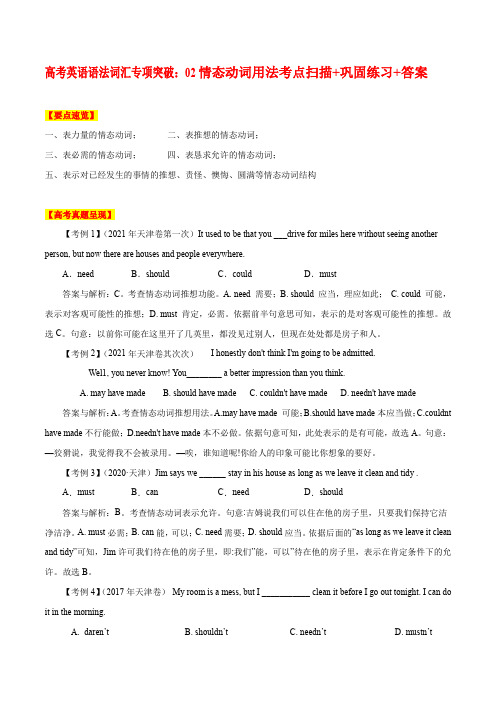
高考英语语法词汇专项突破:02情态动词用法考点扫描+巩固练习+答案【要点速览】一、表力量的情态动词;二、表推想的情态动词;三、表必需的情态动词;四、表恳求允许的情态动词;五、表示对已经发生的事情的推想、责怪、懊悔、圆满等情态动词结构【高考真题呈现】【考例1】(2021年天津卷第一次)It used to be that you ___drive for miles here without seeing another person, but now there are houses and people everywhere.A.need B.should C.could D.must答案与解析:C。
考查情态动词推想功能。
A. need 需要;B. should 应当,理应如此;C. could 可能,表示对客观可能性的推想;D. must 肯定,必需。
依据前半句意思可知,表示的是对客观可能性的推想。
故选C。
句意:以前你可能在这里开了几英里,都没见过别人,但现在处处都是房子和人。
【考例2】(2021年天津卷其次次)---I honestly don't think I'm going to be admitted.---Wel1, you never know! You________ a better impression than you think.A. may have madeB. should have madeC. couldn't have madeD. needn't have made答案与解析:A。
考查情态动词推想用法。
A.may have made 可能;B.should have made本应当做;C.couldnt have made不行能做;D.needn't have made本不必做。
依据句意可知,此处表示的是有可能,故选A。
2021届 高中英语语法--情态动词复习+练习含答案
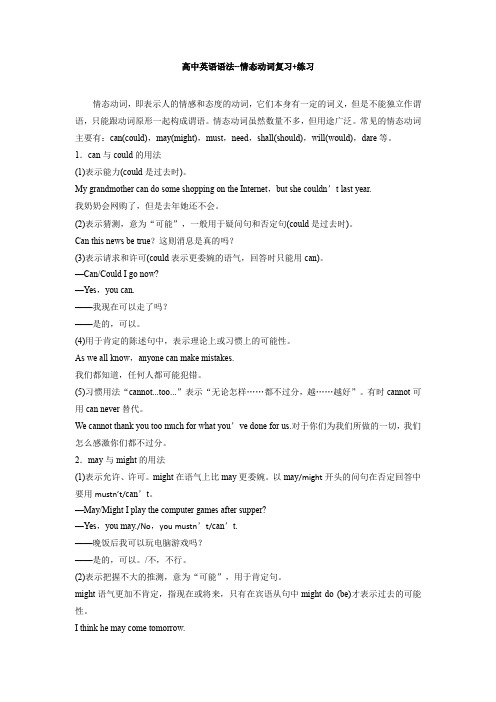
高中英语语法--情态动词复习+练习情态动词,即表示人的情感和态度的动词,它们本身有一定的词义,但是不能独立作谓语,只能跟动词原形一起构成谓语。
情态动词虽然数量不多,但用途广泛。
常见的情态动词主要有:can(could),may(might),must,need,shall(should),will(would),dare等。
1.can与could的用法(1)表示能力(could是过去时)。
My grandmother can do some shopping on the Internet,but she couldn’t last year.我奶奶会网购了,但是去年她还不会。
(2)表示猜测,意为“可能”,一般用于疑问句和否定句(could是过去时)。
Can this news be true?这则消息是真的吗?(3)表示请求和许可(could表示更委婉的语气,回答时只能用can)。
—Can/Could I go now?—Yes,you can.——我现在可以走了吗?——是的,可以。
(4)用于肯定的陈述句中,表示理论上或习惯上的可能性。
As we all know,anyone can make mistakes.我们都知道,任何人都可能犯错。
(5)习惯用法“cannot...too...”表示“无论怎样……都不过分,越……越好”。
有时cannot可用can never替代。
We cannot thank you too much for what you’ve done for us.对于你们为我们所做的一切,我们怎么感激你们都不过分。
2.may与might的用法(1)表示允许、许可。
might在语气上比may更委婉。
以may/might开头的问句在否定回答中要用mustn’t/can’t。
—May/Might I play the computer games after supper?—Yes,you may./No,you mustn’t/can’t.——晚饭后我可以玩电脑游戏吗?——是的,可以。
高考英语语法专攻-《情态动词》-考点归纳+针对性练习
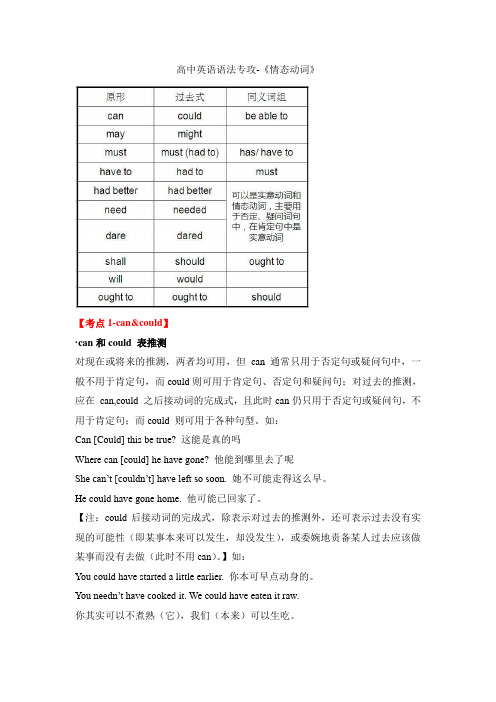
高中英语语法专攻-《情态动词》【考点1-can&could】·can和could 表推测对现在或将来的推测,两者均可用,但can 通常只用于否定句或疑问句中,一般不用于肯定句,而could则可用于肯定句、否定句和疑问句;对过去的推测,应在can,could 之后接动词的完成式,且此时can仍只用于否定句或疑问句,不用于肯定句;而could 则可用于各种句型。
如:Can [Could] this be true? 这能是真的吗Where can [could] he have gone? 他能到哪里去了呢She can’t [couldn’t] have left so soon. 她不可能走得这么早。
He could have gone home. 他可能已回家了。
【注:could后接动词的完成式,除表示对过去的推测外,还可表示过去没有实现的可能性(即某事本来可以发生,却没发生),或委婉地责备某人过去应该做某事而没有去做(此时不用can)。
】如:You could have started a little earlier. 你本可早点动身的。
You needn’t have co oked it. We could have eaten it raw.你其实可以不煮熟(它),我们(本来)可以生吃。
·can和could表允许表示现在的允许时,若是请求别人允许自己做某事,两者均可用,但用could 语气更委婉;若是自己允许别人做某事,一般只用can,而不用could。
如:Can [Could] I come in? 我可以进来吗“Could [Can] I use your pen? ” “Yes,of course you can.”“我可以借用你的钢笔吗?”“当然可以。
”(不能说Yes,you could.)表示过去的允许时,若表示过去一般性允许(即表示某人随时都可以做某事),用could;若表示在过去某一特定情况下允许进行某一特定的活动,则不用could。
英语语法情态动词归纳总结

【答案】A
【解析】
【详解】
考查情态动词词义辨析。A. shall用于法律法规或条文中,表示义务、规定等;B. need需要;C. will会;D. must必须。句意:——我能用信用卡支付么?——对不起,先生,现金支付是我们酒店的管理规定。故A项正确。
9.— Excuse me, could you please tell me how to get to the nearest Wenfeng Supermarket?
— OK, It’s two blocks straight ahead. You ________ miss it.
A.can’tB.mustn’t
C.needn’tD.wouldn’t
【答案】A
【解析】
【详解】
考查情态动词。句意:——劳驾,你能告诉我最近的Wenfeng Supermarket怎么走吗?——好的,一直往前走两个街区就到了。你不会错过的。A. can’t不可能;B. mustn’t禁止,不允许;C. needn’t不必;D. wouldn’t不会。故选A。
14.—I don’t really like Janes. Why did you invite him?
—Don’t worry. Hecome. He said he was’t certain what his plans were.
needn't+have+过去分词
用法:表示对过去已经做了某事的后悔,意为:本来可以不必......的(可实际上却已经......)You needn't have taken a taxi here, for it was very near to my home.
高一英语情态动词和虚拟语气高频考点精准练习(含详解答案)
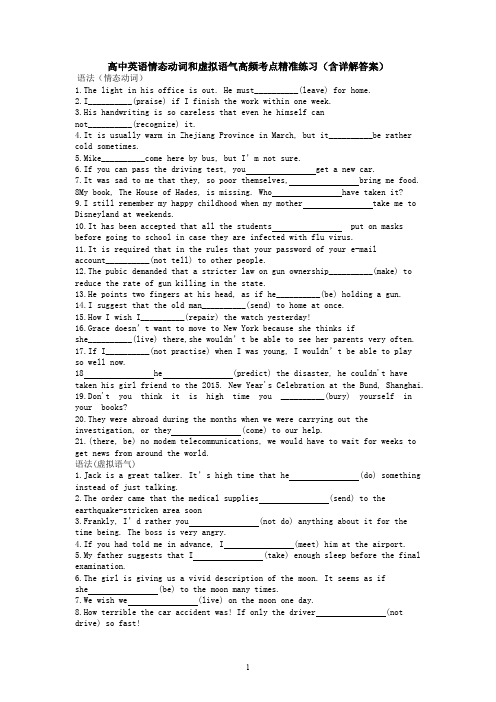
高中英语情态动词和虚拟语气高频考点精准练习(含详解答案)语法(情态动词)1.The light in his office is out. He must__________(leave) for home.2.I__________(praise) if I finish the work within one week.3.His handwriting is so careless that even he himself cannot__________(recognize) it.4.It is usually warm in Zhejiang Province in March, but it__________be rather cold sometimes.5.Mike__________come here by bus, but I’m not sure.6.If you can pass the driving test, you get a new car.7.It was sad to me that they, so poor themselves, bring me food. 8My book, The House of Hades, is missing. Who have taken it?9.I still remember my happy childhood when my mother take me to Disneyland at weekends.10.It has been accepted that all the students put on masks before going to school in case they are infected with flu virus.11.It is required that in the rules that your password of your e-mailaccount__________(not tell) to other people.12.The pubic demanded that a stricter law on gun ownership__________(make) to reduce the rate of gun killing in the state.13.He points two fingers at his head, as if he__________(be) holding a gun.14.I suggest that the old man__________(send) to home at once.15.How I wish I__________(repair) the watch yesterday!16.Grace doesn’t want to move to New York because she thinks ifshe__________(live) there,she wouldn’t be able to see her parents very often. 17.If I__________(not practise) when I was young, I wouldn’t be able to playso well now.18 he (predict) the disaster, he couldn't have taken his girl friend to the 2015. New Year's Celebration at the Bund, Shanghai.19.Don't you think it is high time you __________(bury) yourself in your books?20.They were abroad during the months when we were carrying out the investigation, or they (come) to our help.21.(there, be) no modem telecommunications, we would have to wait for weeks to get news from around the world.语法(虚拟语气)1.Jack is a great talker. It’s high time that he(do) something instead of just talking.2.The order came that the medical supplies (send) to the earthquake-stricken area soon3.Frankly, I’d rather you(not do) anything about it for the time being. The boss is very angry.4.If you had told me in advance, I (meet) him at the airport.5.My father suggests that I (take) enough sleep before the final examination.6.The girl is giving us a vivid description of the moon. It seems as ifshe (be) to the moon many times.7.We wish we (live) on the moon one day.8.How terrible the car accident was! If only the driver (not drive) so fast!9.We lost our way in that small village, otherwise we (visit) more places of interest yesterday.10. I known about this computer program, a huge amount of time and energy would have been saved.改错23.The door is open .Someone can have come in while I was out.24.You needn’t to worry too much.25.To keep fit,we ought take exercise every day.26.A few years ago I might bring my wife to this place for dinner.27.His English is so poor.He mustn’t be a native speaker.28.I’m feeling much better now,so you mustn’t call the doctor.29.She told him he ought finish his homework as soon as possible.30.Dare you to tell your parents about your school records?31.If she didn’t fallen off the bike yesterday, she wouldn’t be in hospital now.32.She insisted that she could organize the trip properly.33.I’d rather you go home now.34.Our English teacher gave us a suggestion that we made good use of our time.35.The teacher insisted that we must hand in our exercise before supper.36.If I am you, I would not accept his gift.37I enjoyed the movie very much. I wish I read the original book before.单选1.The doctor recommended he stayed a few more days in hospital.2.一How shall we go to that airport?—Well,I recommend take a taxi.39.It’s strange that he _______have taken the books without the owner’s permission.A.wouldB.shouldC.couldD.might40.I can’t find my purse. I___________ it in the supermarket yesterda y, but I’m not sure.A.should leaveB.must have leftC.might leaveD.could have left41_____ you continue in your efforts and achieve new and greater successes.A.WouldB.WillC.MayD.Should42.—Must I go out to have dinner with you, Mum?—No, you ______, my dear. You’re free to make your own decision.A.shouldn’tB.mustn’tC.needn’tD.can’t43.But for their help, we ______ the program in time.A.cannot finishB.will not finishC.had not finishedD.could not have finished44.As we all know, he has regretted wasting the precious time when he ________ studied hard playing computer games at school.A.should haveB.would haveC.might haveD.must have45.—The computer costs $900.—It ________ be that expensive. Anyway, it is a used one.A.mustn’tB.won’tC.shouldn’tD.needn’t46.The boy insisted that he ________ the money and _______ at once.A.not steal; be set freeB.hadn’t stolen; be set freeC.didn’t steal; should set freeD.hadn’t stolen; set free47.The first thing you must remember is that in order to succeed, it is almost compulsory that you ______ optimistic.A.beB.areC.must beD.have been48.—I forgot all about the party yesterday.—I _______ , too, if my secretary hadn’t reminded me.A.didB.hadC.shouldD.would have49.Without the atmosphere protecting them, the living creatures on earth________.A.didn't surviveB.wouldn't surviveC.hadn't survivedD.don't survive参考答案1.答案:have left解析:2.答案:shall be praised解析:3.答案:recognize解析:4.答案:can解析:5.答案:may/ might解析:答案:shall答案:should解析:本题考查情态动词的基本用法。
高中英语语法单项选择题分类整理练习 情态动词(word,解析版)
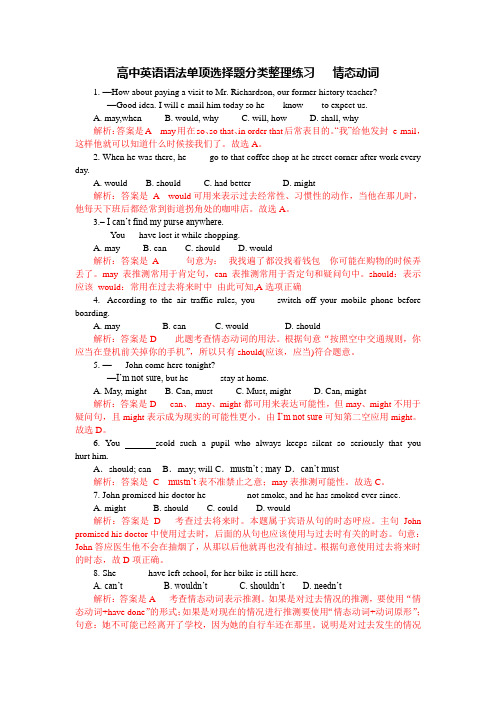
高中英语语法单项选择题分类整理练习情态动词1. —How about paying a visit to Mr. Richardson, our former history teacher?—Good idea. I will e-mail him today so he ___ know ___ to expect us.A. may,whenB. would, whyC. will, howD. shall, why解析:答案是A may用在so、so that、in order that后常表目的。
“我”给他发封e-mail,这样他就可以知道什么时候接我们了。
故选A。
2. When he was there, he ____ go to that coffee shop at he street corner after work every day.A. wouldB. shouldC. had betterD. might解析:答案是 A would可用来表示过去经常性、习惯性的动作,当他在那儿时,他每天下班后都经常到街道拐角处的咖啡店。
故选A。
3.–I can’t find my purse anywhere.-- You __ have lost it while shopping.A. mayB. canC. shouldD. would解析:答案是A 句意为:--我找遍了都没找着钱包---你可能在购物的时候弄丢了。
may表推测常用于肯定句,can表推测常用于否定句和疑问句中。
should:表示应该would:常用在过去将来时中由此可知,A选项正确4. According to the air traffic rules, you ___ switch off your mobile phone before boarding.A. mayB. canC. wouldD. should解析:答案是D 此题考查情态动词的用法。
高中英语新人教版必修三Unit 5语法汇总(过去将来时+情态动词)
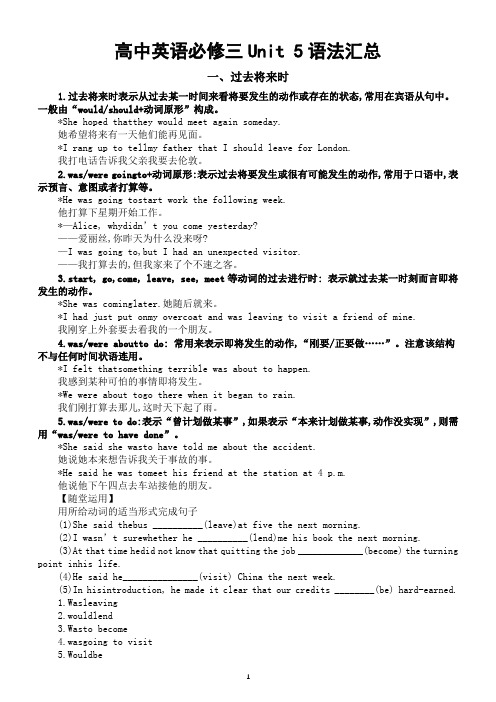
高中英语必修三Unit 5语法汇总一、过去将来时1.过去将来时表示从过去某一时间来看将要发生的动作或存在的状态,常用在宾语从句中。
一般由“would/should+动词原形”构成。
*She hoped thatthey would meet again someday.她希望将来有一天他们能再见面。
*I rang up to tellmy father that I should leave for London.我打电话告诉我父亲我要去伦敦。
2.was/were goingto+动词原形:表示过去将要发生或很有可能发生的动作,常用于口语中,表示预言、意图或者打算等。
*He was going tostart work the following week.他打算下星期开始工作。
*—Alice, whydidn’t you come yesterday?——爱丽丝,你昨天为什么没来呀?—I was going to,but I had an unexpected visitor.——我打算去的,但我家来了个不速之客。
3.start, go,come, leave, see, meet等动词的过去进行时: 表示就过去某一时刻而言即将发生的动作。
*She was cominglater.她随后就来。
*I had just put onmy overcoat and was leaving to visit a friend of mine.我刚穿上外套要去看我的一个朋友。
4.was/were aboutto do: 常用来表示即将发生的动作,“刚要/正要做……”。
注意该结构不与任何时间状语连用。
*I felt thatsomething terrible was about to happen.我感到某种可怕的事情即将发生。
*We were about togo there when it began to rain.我们刚打算去那儿,这时天下起了雨。
高中英语新高考一轮语法复习讲义(三十八)情态动词+have done用法总结(含针对训练与解析)

2021届高中英语新高考一轮语法复习讲义(三十八)情态动词+have done用法总结(含针对训练与解析)如:1)It must have rained last night ,for the ground is wet.2) You can't have forgotten it .3)I should/ought to have told you about it ,but I forgot.4)You needn't have waken me so early, for today is sunday.5)It's too late , she may have gone to bed.6)You had better have started earlier.7) I would rather have finished my article ahead of time.8)I would love to have visited you yesterday ,but I was too busy.真题演练用适当的情态动词填空。
1. I can’t find mypurse. I (leave)it in the supermarket yesterday, but I’m not sure.句意:我找不到钱包了!我可能昨天把它忘到超市里了,不过我不确定。
2. I have worried before I came to the new school, for my classmates here are very friendly tome.3.—Sorry, Mum! I failed the job interview again.—Oh, it’s toobad. You have made full preparations. 4. My book, The House of Hades, is missing. Who have taken it?句意:我的书《哈迪斯之屋》丢了。
情态动词may、might、must考点总结讲义 高三英语高考语法专题复习

高三英语高考语法专题复习情态动词may、might、must考点总结与练习高三英语教研组整理热身练习:1.Why __________ you choose to work in a remote village school when you can own a respectable job in a city?2.You ________ be careful with the camera. It costs!3.You ________ feel all the training a waste of time, but I’m a hundred percent sure later you’ll be grateful you did it.4.—Can’t you stay a little longer?—It’s getting late. I really ________ go now. My daughter is home alone.5.—What a slow bus this is!—Yes, we____just as well walk.参考答案与解析:1.must考查情态动词。
句意:既然你能在城市里拥有一份体面的工作,为什么偏要选择在偏远的乡村学校工作呢?此处考查must的特殊用法,(why) must you....? 意为“(为什么)你偏偏,非要”,故填must。
2.must考查情态动词。
句意:你一定要非常小心地对待这部照相机,它很昂贵。
根据“It costs!”可知,此处表示“必须,一定”,需用情态动词must。
故填must。
3.may考查情态动词。
句意:你也许会认为所有的培训都是浪费时间,但是我百分之百地保证你以后会感激你所做的事情。
根据后文的描述I’m a hundred percent sure可知,空处表示可能性,是一种不确定的推测。
故填may。
高考英语语法情态动词和虚拟语气讲解练习含答案
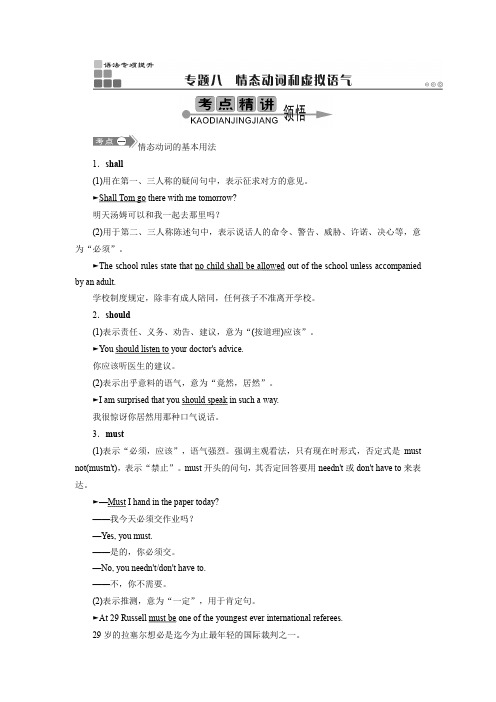
情态动词的基本用法1.shall(1)用在第一、三人称的疑问句中,表示征求对方的意见。
►Shall Tom go there with me tomorrow?明天汤姆可以和我一起去那里吗?(2)用于第二、三人称陈述句中,表示说话人的命令、警告、威胁、许诺、决心等,意为“必须”。
►The school rules state that no child shall be allowed out of the school unless accompanied by an adult.学校制度规定,除非有成人陪同,任何孩子不准离开学校。
2.should(1)表示责任、义务、劝告、建议,意为“(按道理)应该”。
►You should listen to your doctor's advice.你应该听医生的建议。
(2)表示出乎意料的语气,意为“竟然,居然”。
►I am surprised that you should speak in such a way.我很惊讶你居然用那种口气说话。
3.must(1)表示“必须,应该”,语气强烈。
强调主观看法,只有现在时形式,否定式是must not(mustn't),表示“禁止”。
must开头的问句,其否定回答要用needn't或don't have to来表达。
►—Must I hand in the paper today?——我今天必须交作业吗?—Yes, you must.——是的,你必须交。
—No, you needn't/don't have to.——不,你不需要。
(2)表示推测,意为“一定”,用于肯定句。
►At 29 Russell must be one of the youngest ever international referees.29岁的拉塞尔想必是迄今为止最年轻的国际裁判之一。
情态动词和have done知识点总结与练习讲义(含解析)新高考英语语法微专题培优复习
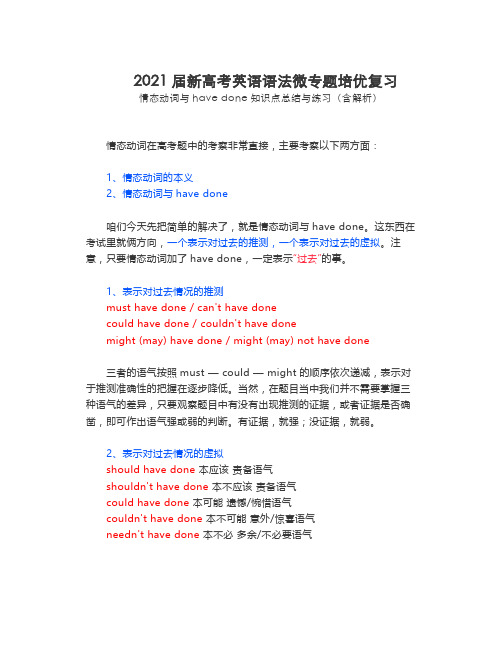
2021届新高考英语语法微专题培优复习情态动词与have done知识点总结与练习(含解析)情态动词在高考题中的考察非常直接,主要考察以下两方面:1、情态动词的本义2、情态动词与have done咱们今天先把简单的解决了,就是情态动词与have done。
这东西在考试里就俩方向,一个表示对过去的推测,一个表示对过去的虚拟。
注意,只要情态动词加了have done,一定表示“过去”的事。
1、表示对过去情况的推测must have done / can't have donecould have done / couldn't have donemight (may) have done / might (may) not have done三者的语气按照must — could — might的顺序依次递减,表示对于推测准确性的把握在逐步降低。
当然,在题目当中我们并不需要掌握三种语气的差异,只要观察题目中有没有出现推测的证据,或者证据是否确凿,即可作出语气强或弱的判断。
有证据,就强;没证据,就弱。
2、表示对过去情况的虚拟should have done本应该责备语气shouldn't have done本不应该责备语气could have done本可能遗憾/惋惜语气couldn't have done本不可能意外/惊喜语气needn't have done本不必多余/不必要语气表示虚拟时,句中一定可以加入“本来……”这样的口吻。
请注意,每种虚拟都有自己的使用场合,进而传达出在该场合下需要体现的语气和态度。
把两方面合并在一起,我们就会发现,情态动词+have done的结构,其实可以这样来方便记忆:must / might (may) 推测+could 推测/虚拟+should / need 虚拟must和might肯定是推测,should和need肯定是虚拟,只有could一个同时身兼两种功能,所以遇到的时候要注意判断。
高中英语情态动词详细讲解及例句
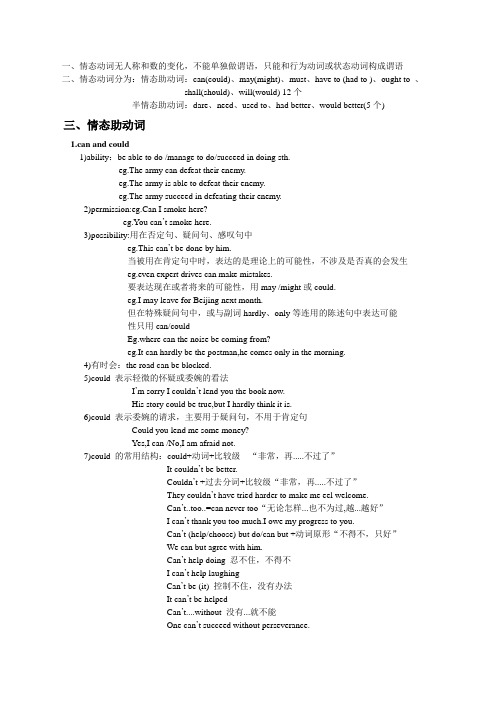
一、情态动词无人称和数的变化,不能单独做谓语,只能和行为动词或状态动词构成谓语二、情态动词分为:情态助动词:can(could)、may(might)、must、have to (had to )、ought to 、shall(should)、will(would) 12个半情态助动词:dare、need、used to、had better、would better(5个)三、情态助动词1.can and could1)ability:be able to do /manage to do/succeed in doing sth.eg.The army can defeat their enemy.eg.The army is able to defeat their enemy.eg.The army succeed in defeating their enemy.2)permission:eg.Can I smoke here?eg.You can’t smoke here.3)possibility:用在否定句、疑问句、感叹句中-eg.This can’t be done by him.当被用在肯定句中时,表达的是理论上的可能性,不涉及是否真的会发生eg.even expert drives can make mistakes.要表达现在或者将来的可能性,用may /might或could.eg.I may leave for Beijing next month.但在特殊疑问句中,或与副词hardly、only等连用的陈述句中表达可能性只用can/couldEg.where can the noise be coming from?eg.It can hardly be the postman,he comes only in the morning.4)有时会:the road can be blocked.5)could 表示轻微的怀疑或委婉的看法I’m sorry I couldn’t lend you the book now.His story could be true,but I hardly think it is.6)could 表示委婉的请求,主要用于疑问句,不用于肯定句Could you lend me some money?Yes,I can /No,I am afraid not.7)could 的常用结构:could+动词+比较级“非常,再.....不过了”It couldn’t be better.Couldn’t +过去分词+比较级“非常,再.....不过了”They couldn’t have tried harder to make me eel welcome.Can’t..too..=can never too“无论怎样...也不为过,越...越好”I can’t thank you too much.I owe my progress to you.Can’t (help/choose) but do/can but +动词原形“不得不,只好”We can but agree with him.Can’t help doing 忍不住,不得不I can’t help laughingCan’t be (it) 控制不住,没有办法It can’t be helpedCan’t....without 没有...就不能One can’t succeed without perseverance.2.may and might1)permission:May I use your pen?Yes,you may./No,you may not.2)Possibility:用于推测,表示不确定,不用于疑问句中She may know Tom’s address.出现I’m afraid.I’m not sure等表示不确定时,常用may/might.I’m afraid he might not come to attend the meeting today.从语气上判断,may表示的可能性比might 大,might更多的表示怀疑He may be very busy now.He might be very busy now.3)用于让步状语从句中However hard you may study,you cannot master English in a month.4)用于祈使句,表示祝愿May you succeed!5)might 常用于表示轻微的责备和委婉的请求You might post the letter for me if you are going near a post box.You might have let me know before!6)习惯用法:may as well do”理所当然,有足够的理由”She may be proud of her sonMay /might (just) as well do=had better do(最好)You might as well stay at home tonight.May/might as well+do A+as+do+B”与其做B不如做A”You might as well throw the money away as lend it to him.One may as well not know a thing at all as know it but imperfectly3.must and have to1)表示义务,一定要,必须You must arrive in good time.The meeting is very important.2)表示肯定性或难以避免,必然会,肯定会All men must die.3)must 表示有把握的推测,一定是,准时Must do/must be doing/must have doneThe tall fellow must be a basketball player.Let’s have something.You must be starving.He must have received mu letter which has mailed last week.4)must 表示非要,偏要,常以第二人称为主语,意指不耐或令人不愉快的事情,用于其他人称,表示主语固执,意为偏偏Why must you buy that car?Jane was never a pleasant young girl.After you gave her your advice,she must goand do the opposite.5)must 的三种否定形式表示不可能must be --can’t be must have done--can’t have doneYou must have met him before.You can’t have met him before.表示不必must do--need not to/don’t have toWe must get up at six tomorrow morning.We don’t have to get up at six tomorrow morning.表示决不能,严禁must--mustn’tYou mustn’t park your car here.6)回答以must提问的句子Must we clean all the rooms?Yes ,you must/No ,you don’t have to/No ,you needn’t7)must 可做名词,表示必须有的东西,必须做的事Warm clothes are a must in the mountains.8)must和have to 表示必须时,有一下差别Must 表示的是说话人主观的看法,而have to则往往强调客观需要The play is not interesting ,I really must go now.I have to work when I was your age.Must 一般只表现在,have to 则有更多的时态。
高考英语情态动词讲解及习题(附答案)
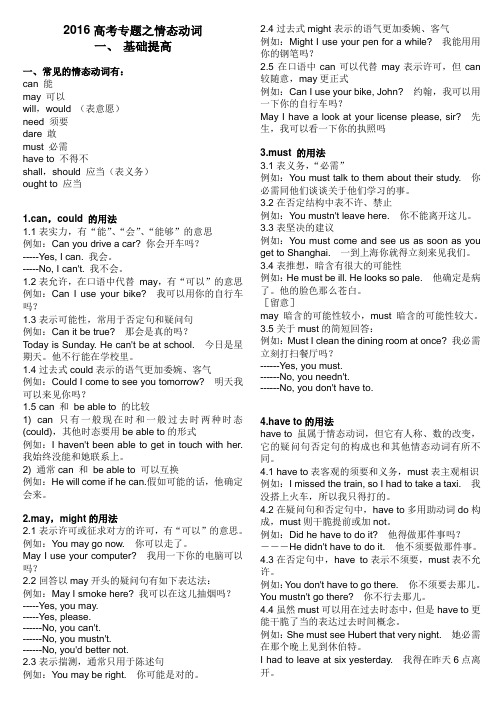
2016高考专题之情态动词一、基础提高一、常见的情态动词有:can 能may 可以will,would (表意愿)need 须要dare 敢must 必需have to 不得不shall,should 应当(表义务)ought to 应当1.can,could 的用法1.1表实力,有“能”、“会”、“能够”的意思例如:Can you drive a car? 你会开车吗?-----Yes, I can. 我会。
-----No, I can't. 我不会。
1.2表允许,在口语中代替may,有“可以”的意思例如:Can I use your bike?我可以用你的自行车吗?1.3表示可能性,常用于否定句和疑问句例如:Can it be true?那会是真的吗?Today is Sunday. He can't be at school.今日是星期天。
他不行能在学校里。
1.4过去式could表示的语气更加委婉、客气例如:Could I come to see you tomorrow?明天我可以来见你吗?1.5 can 和be able to 的比较1) can 只有一般现在时和一般过去时两种时态(could),其他时态要用be able to的形式例如:I haven't been able to get in touch with her.我始终没能和她联系上。
2) 通常can 和be able to 可以互换例如:He will come if he can.假如可能的话,他确定会来。
2.may,might的用法2.1表示许可或征求对方的许可,有“可以”的意思。
例如:You may go now.你可以走了。
May I use your computer?我用一下你的电脑可以吗?2.2回答以may开头的疑问句有如下表达法:例如:May I smoke here? 我可以在这儿抽烟吗?-----Yes, you may.-----Yes, please.------No, you can't.------No, you mustn't.------No, you'd better not.2.3表示揣测,通常只用于陈述句例如:You may be right.你可能是对的。
- 1、下载文档前请自行甄别文档内容的完整性,平台不提供额外的编辑、内容补充、找答案等附加服务。
- 2、"仅部分预览"的文档,不可在线预览部分如存在完整性等问题,可反馈申请退款(可完整预览的文档不适用该条件!)。
- 3、如文档侵犯您的权益,请联系客服反馈,我们会尽快为您处理(人工客服工作时间:9:00-18:30)。
情态动词总结I 情态动词的特征:1.本身有词义。
2.不能独立作谓语。
2. 后接动词原形一起构成谓语。
3. 不随人称和数的变化。
II 情态动词各自的基本意义及用法:II 情态动词表推测:1.大多数情态动词(除表‘能力、许可、意志’外),都可以表示推测,其程度有差异。
按可能性程度的高低排列为:must ﹥will ﹥would ﹥ought to ﹥should完全肯定完全可能很可能﹥can ﹥could﹥may ﹥might可能有可能2. 区分情态动词的否定含义:may not或许不、可能不might not可能不can’t 不可能《mustn’t不许、禁止shouldn’t不应该needn’t 不必3. 情态动词表推测具体运用:情态动词可以对现在、进行、过去推测。
III 情态动词表推测的反意疑问句1.情态动词表推测的反意疑问句,简单来说,就是以情态动词后的时态为淮,如句子里有明确的时间状语,则以其为准。
2.以must 为例:—. 1. You must be hungry now, aren’t you2. He must be watching TV , isn’t he3 Tom must have lived her for a long time, hasn’t he4. She must have arrived yesterday, didn’t she注:如选择题中(以She must have arrived yesterday, didn’t she为例)既有didn’t she又有hasn’t she则以didn’t she为最佳答案。
IV 情态动词专项练习与解析一( ) 1. You _____ return the book now. You can keep it till next week if you like.、A. can’tB. mustn’tC. needn’tD. may not( ) 2. Where is my pen I _____ it.A. might loseB. would have lostC. should have lostD. must have lost( ) 3. I wish I _____ you yesterday.A. seenB. did seeC. had seenD. were to see( ) 4. I didn’t hear the phone. I _____ asleep.A. must beB. must have beenC. should beD. should have been;( ) 5. If my lawyer _____ here last Saturday, he _____ me from going.A. had been; would have preventedB. had been; would preventC. were; would preventD. were; would have prevented( ) 6. He _____ you more help, even though he was very busy.A. might have givenB. might haveC. may have givenD. may give( ) 7. If it _____ for the snow, we _____ the mountain yesterday.A. were not; could have climbedB. were not; could climbC. had not been; could have climbedD. had not been; could climb|( ) 8. Without electricity human life _____ quite difficult today.A. isB. will beC. would have beenD. would be( ) 9. A computer _____ think for itself, it must be told what to do.A. can’tB. couldn’tC. may notD. might not( ) 10. Jenny _____ have kept her word. I wonder why she changed her mind.A. mustB. shouldC. needD. would( )11. We _____ last night, but we went to the concert instead.A. must have studiedB. might study》C. should have studiedD. would study( ) 12. — Could I borrow your dictionary— Yes, of course you _____.A. mightB. willC. canD. should( ) 13. Tom ought not to _____ me your secret, but he meant no harm.A. have toldB. tellC. be tellingD. having told( ) 14. — If he _____, he _____ that food.— Luckily he was sent to the hospital immediately.;A. was warned; would not takeB. had been warned; would not have takenC. would be warned; had not takenD. would have been warned; had not taken ( ) 15. Peter _____ come with us tonight, but he isn’t v ery sure yet.A. mustB. mayC. canD. will( ) 16. I told Sally how to get here, but perhaps I _____ for her.A. had to write it outB. must have written it outC. should have written it outD. ought to write it out( ) 17. I didn’t see your sister at the meeting. If she _____, she would have met my brother.¥A. has comeB. did comeC. cameD. had come( ) 18. — Shall I tell John about it—No, you _____. I’ve told him already.A. needn’tB. wouldn’tC. mustn’tD. shouldn’t ( ) 19. When a pencil is partly in a glass of water, it looks as if it _____.A. breaksB. has brokenC. were brokenD. had been broken( ) 20. It’s nearly seven o’clock. Jack _____ be here at any moment.&A. mustB. needC. shouldD. can( ) 21.— There were already five people in the car but they managed to take me as well.— It _____ a comfortable journey.A. can’t beB. shouldn’t beC. mustn’t have beenD. couldn’t have been ( ) 22. Johnny, you _____ play with the knife, you _____ hurt yourself.A. won’t; can’tB. mustn’t; mayC. shouldn’t; mustD. can’t; shouldn’t ( ) 23. The fire spread through the hotel very quickly but everyone _____ get out.A. had toB. wouldC. couldD. was able to,( ) 24. — When can I come for the photos I need them tomorrow afternoon.— They _____ be ready by 12:00.A. canB. shouldC. mightD. need( ) 25. — I stayed at a hotel while in New York.— Oh, did you You _____ with Barbara.A. could have stayedB. could stayC. would stayD. must have stayed( ) 26. — Will you stay for lunch— Sorry, _____. My brother is coming to see me.#A. I mustn’tB. I can’tC. I needn’tD. I won’t( ) 27. — Are you coming to Jeff’s party—I’m not sure. I _____ go to the concert instead.A. mustB. wouldC. shouldD. might( ) 28. — Write to me when you get home.— _____.A. I mustB. I shouldC. I willD. I can( ) 29. I was really anxious about you, you _____ home without a word.、A. mustn’t leaveB. shouldn’t have leftC. couldn’t have leftD. needn’t leave( ) 30. — Is John coming by train— He should, but he _____ not. He likes driving his car.A. mustB. canC. needD. may专项练习(二)1. I didn’t see her in the meeting room this morning. She _____ at the meeting.A. mustn’t have spokenB. shouldn’t have spokenC. needn’t have spokenD. couldn’t have spoken2. One ought _____ for what one hasn’t done.A. not to be punishedB. to not be punishedC. to not punishedD. not be punished3. If you really want yourself to be in good health, you must ___ always ___ so much.A. not; be smokingB. not; have smokedC. not; to smokeD. be not; smoking4. With so much work on hand, you _____ to see the game last night.A. mustn’t goB. shouldn’t go。
